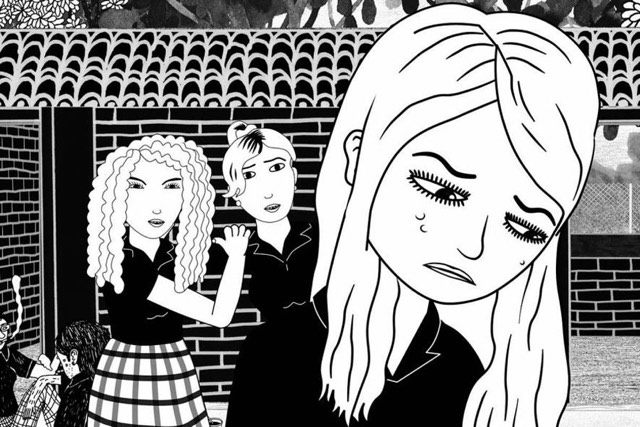
Virus Tropical (Santiago Caicedo, Colombia/Ecuador, 2017): The ‘infectious’ nature of female subjectivity
In the spirit of continuing support and community as the world continues to fight against Covid-19, today at Mediático we bring you the first of two posts. Firstly, an excellent introduction to the animated coproduction between Ecuador and Colombia Virus Tropical (Santiago Caicedo, 2017) currently streaming on Mubi by regular contributor Natália Pinazza (@DrNPinazza) lecturer in Portuguese at the University of Exeter.
And secondly, in tomorrow’s post, the world premiere of an extended time line and video interview with Powerpaola, author of the graphic novel Virus Tropical on which the film is based. The interview is the first of the Latin American Writers Series sponsored by the Stone Center for Latin American Studies at Tulane University, New Orleans.
Virus Tropical (Santiago Caicedo, 2017) : The ‘infectious’ nature of female subjectivity
By Natália Pinazza
Adapted from Powerpaola’s graphic novel memoir Virus Tropical (2011), this directorial feature debut from Santiago Caicedo is a tale of resilient femininity and a fragmented family unit that pulls the viewer into the inner world of Paola, an Ecuadorian girl who later moves to Colombia. Although the title ‘Virus Tropical’ evokes the timeliness of infectious disease as subject matter, the virus in question is a powerful metaphor of the impetus to break away from patriarchy. We witness three generations of Latin American women – the protagonist, her mother and two older sisters – grow more and more independent. Nonetheless, the virus has a ‘tropical’ origin, namely the ingrained Catholicism and social inequality of South America.
The title of this Colombian-Ecuadorian animation comes from a misdiagnosis Paola’s mother receives from a doctor, quick to dismiss her symptoms of pregnancy as a ‘tropical virus’. In this way, the film establishes from its start the connection between ‘tropical virus’ and a woman’s voice and knowledge of her body. Although the film is often referred to as a South American Persepolis (Marjane Satrapi, 2008), based on Satrapi’s graphic novel, about her life in pre and post-revolutionary Iran and then in Europe, Virus Tropical does not engage overtly with the political context. Instead, the socio-political problems of both Ecuador and Colombia come into play through Paola’s accounts of childhood and teenage memories. For example, she kisses her first boyfriend while a shooting is taking place, an apt comment on growing up in Cali in a time marked by drug cartels and violence.
The absence of Paola’s father for much of her life, another recurring theme in Latin American films – notable examples include Central Station (1999) and Martín (Hache) (1997) – comes accompanied by a critique of religion and the tendency to place all responsibility on the mother. The father, a crucial part of the family unit promoted by religious discourse, is absent because he returns to the priesthood. Ironically, it is precisely religion which dismantles the family unit and has progressively been a source of disappointment. Before leaving, her father encourages her to take part in a drawing contest to meet the Pope during his visit. Despite winning the contest, she takes the drawing for the Pope only to be greeted by a truculent army. It is worth mentioning that Latin Americans are no stranger to disappointments at the Pope’s visit to the continent as portrayed in The Pope’s Toilet (2007). While the father figure is absent, the mother raises the three children practically on her own, supporting her daughters through situations ranging from teenage rebellion, financial support for their studies, break-up, and motherhood. We often see the family in various instances in front of the Aeropuerto Internacional Mariscal Sucre, as the family unit has been profoundly affected by geographical distances between its members. Nonetheless, the recurrence of the drawing of the airport also indicates the high incidence of departures and returns.
Through its focus on the domestic sphere, Virus Tropical is not only in tune with Latin America’s long tradition of telenovelas but also other contemporary Latin American films. Like in films such as Second Mother (2015), Roma (2018), Live-in Maid (2004), The Fish Child (2009), and The Maid (2014), the recurring figure of the maid, Chavela is also present in Virus Tropical. Chavela plays an active part in the girls’ upbringing and in tragic-comic fashion she tries to cover up her indigenous physical traits by dying her hair and undergoing surgery. However, Chavela is not the only one who looks down on herself. The film has subtle ways of commenting on the collective inferiority syndrome. For instance, at the doctor’s surgery, there is a framed certificate on the wall. The certificate of a USA university automatically imparts the idea of prestige, shown just before the doctor’s misdiagnosis, which debunks the tacit assumption that education abroad is a synonym of competence. Later we learn that her sister also has an opportunity to study in Italy. Another scene that playfully addresses inferiority issues is in the scene where Paola’s mother pours Ecuadorian’s rum into a Colombian run bottle and offers it to party guests, who think they are drinking imported rum. The scene of her pouring Ecuadorian rum into the Colombian bottle is juxtaposed to guests commenting how ‘they do not know how to make rum like this here’.
Intercultural elements are also imparted by Paola’s negotiation of accents and knowledge of vocabulary in different varieties of Spanish such as ‘pizarrón’ and ‘tablero’, translated as ‘blackboard’ in Ecuador and Colombia, respectively. There is also the comically heavy anglicised accent that young Paola attributes to her comically animated Barbie and Ken dolls. The dynamics amongst the several Barbie dolls and a single Ken mirror her feelings of sadness, alienation from men, and her sexuality. Because of its bi-narrational narrative, which dialogues both with the dual nationality of Powerpaola and its production context as an international film co-production between Colombia and Ecuador, the back and forth between Quito and Cali also comments on cultural and social differences between the two places. Therefore, interculturality shaped Paola’s sense of self. Upon moving to Colombia as a teenager, Paola suffered from xenophobic comments and was bullied for her Ecuadorian roots at school. Ecuador is portrayed as a more conservative country as opposed to Colombia, where women had more sexual freedom. Paola’s sexuality was not only informed by her conservative upbringing in Quito, but also by the complete absence of men in her life in a world surrounded by her sisters, maid, and mother. The film matches the soundtrack with Paola’s lines and inner world. In one scene, Paola says that men are ‘alien’ to her and later in the film when she gets closer to a love interest the song ‘El Marciano‘ plays.

Paola’s drawing, which acquires a self-reflexive element in the graphic novel, fills the gaps in narration when she momentarily abandons the voice-over narration. The character doodles and magical realist scenes channel Paola’s psyche. The colourfulness and vibrant aesthetics intrinsic to the ‘tropical’ are removed from this black-and-white animation. Instead, it is Paola’s relationship with the environment that foregrounds the vivacity of the South American cities. Paola’s projection of her inner world is so vivid that the striking texture of the animation allows a geographical exploration of Colombia, Galapagos, and the dramatic slopes of Ecuador. The drawing of her childhood’s portrayal of Ecuador embraces its indigenous cultures and geography, which also feature in her drawings as an adult.
As the youngest member of the Gaviria family, Paola experiences situations that are out of her control, and it is her imaginary world that gives her agency. The empowering aspect of her drawings reflects real life as we know Paola made a career out of them, which ultimately resulted in the film. At a metatextual level, the drawings represent the process by which Powerpaola’s subjectivity is formed. The self-expression of South American women can also be read as symptomatic of this metaphorical ‘virus tropical’ from which Paola’s mother supposedly suffered. The mobility of female characters across South American countries is also a symptom that has infected different generations of women and mutated from one age group to another. While self-expression and mobility paved the way for the fragmentation of family unity, offering poignant scenes of difficulties and goodbyes, Tropical Virus re-signifies the ‘infectious’ nature of female resilience and independence.
Virus Tropical is currently streaming on Mubi






